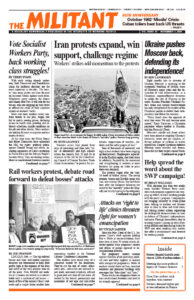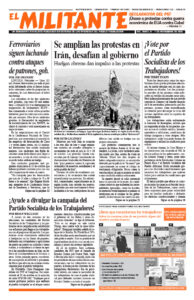Eight months into its invasion of Ukraine, Moscow is resorting to the systematic bombing of civilian areas of Ukraine’s major cities and the destruction of vital infrastructure, as a Ukrainian counteroffensive threatens to retake the city of Kherson in the south. Russian President Vladimir Putin’s drone and missile bombardment has only strengthened the resolve of the Ukrainian people to defend their independence and defeat the invasion.
“Every bomb does the opposite of what they want. We only become more united,” Raisa Yuriyvna, a Ukrainian pensioner whose mother is Russian, told the Financial Times.
Moscow’s missile and drone strikes have been aimed at crippling Ukraine’s electricity, water and gas supplies, affecting millions of civilians as winter approaches. Despite Ukrainian defenses downing many missiles and drones, those that hit their targets caused blackouts in more than 10 regions.
The bombing hasn’t alleviated the precarious position of Russian forces in Kherson. Occupation authorities are in disarray as they strip the city of essential equipment and leave. Tens of thousands of residents, including hospital patients, have been evacuated across the Dnipro River by Moscow. The Ukrainian government says this is a forced deportation of civilians, alongside Moscow’s “disappearance” of prisoners of war. Substantial protests against Moscow’s occupation of Kherson took place in May.
Moscow says it’s sending reinforcements, including recently mobilized soldiers, to Kherson.
“We were outraged when he was sent to Ukraine with no training,” Svetlana Puchkova told the Moscow Times about her brother-in-law, Igor. He was drafted from Minusinsk, Siberia, last month and sent to southern Ukraine where he was killed. His only previous brief military experience had been in 2015.
Moscow is also deploying more troops and aircraft to bases in Belarus on Ukraine’s northern border, posing the danger of another front opening up. But Belarusian President Alexander Lukashenko, a Putin ally, fears that involvement in the Kremlin’s failing war would expand and deepen opposition among working people to his regime. Addressing the Ukrainian government, he said, “If you do not want to fight with us, then we will not. There will be no war.”
Workers volunteer in war effort
Working people in Ukraine have been at the center of resistance to the invasion ever since their initiatives backing the Ukrainian army led to the defeat of Moscow’s drive to take Kyiv. Tens of thousands have trained to fight while others have formed volunteer networks to provide aid and reconstruction.
Chernihiv, a city northeast of Kyiv, was surrounded and bombarded by Russian forces in March during their failed attempt take the capital. A large pizzeria there was transformed by hundreds of volunteers from all walks of life. They used it to feed up to 22,000 people daily, delivering food free to the army, emergency services, hospitals and city residents. Later this included people in 190 nearby villages that had been under occupation. Volunteers also worked to repair homes damaged by Russian bombing.
In the first major union action since Ukrainian President Volodymyr Zelensky’s government banned strikes, underground miners at Novovolynsk Mine No. 9 in the west of the country waged a monthlong strike. They won a round Oct. 6 when the energy ministry dismissed a new mine manager whose appointment was opposed by the union. He was part of a layer of corrupt state officials trying to advance embezzlement schemes, like illegally diverting sales of coal.
Mykhailo Volynets, chair of the Independent Trade Union of Ukrainian Miners, told OpenDemocracy Oct. 21 that this “will happen again … these corrupt renegades have not calmed down.” And workers are demanding their unpaid August wages.
Putin’s draft deepened alarm over the war as husbands, fathers and sons have been sent to the front. In a six-minute video, Mikhail Ashichev, a mechanic from Podporozhye, Leningrad, explains why he refuses to be part of Moscow’s war. “The people around me are terrified due to mobilization, because now this affects everyone,” he says. He would rather go to jail than fight in Ukraine, because there “parents are burying their children.”
“I’m not a pacifist,” he explained. “If a country was trying to occupy my Motherland, or commit aggression against Russia,” he would sign up. The government, he says, is “used to treating people like objects. … I get the feeling these people are terrified of losing control. They’re used to controlling everything.”
Protests against the war continue in Russia. Art teachers in Cheboksary, the capital of the Chuvash Republic, had asked students to make drawings on the theme “No to the war,” and send them to Russian soldiers. The Chuvash people are an ethnic minority long subject to discrimination at the hands of Moscow.

